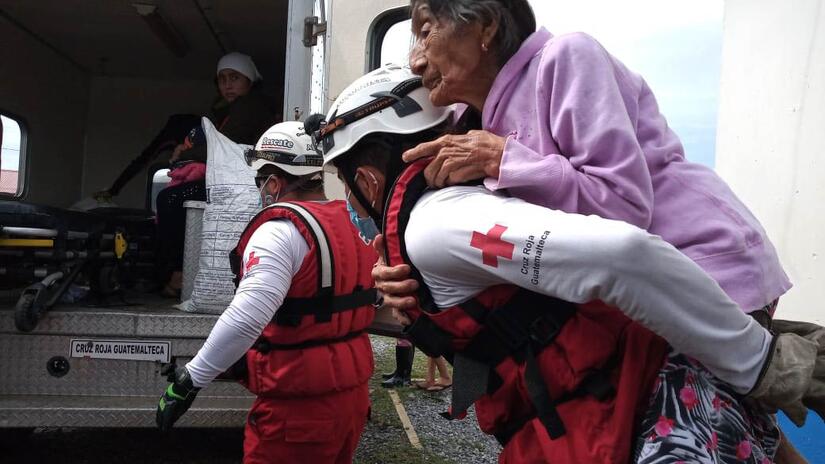Panama, 11 March 2022. Two years since the onset of the COVID-19 pandemic five million more people are in extreme poverty in Latin America and the Caribbean, making them more exposed to the impact of disasters, warns the International Federation of Red Cross and Red Crescent Societies (IFRC). This brings the total number of people in extreme poverty in the region to 86 million, with women, migrants and people in vulnerable urban areas especially impacted.
Since the start of the pandemic in 2020, the IFRC and Red Cross societies network in the Americas have provided water, sanitation and community hygiene services to more than 10 million people. Its teams in the field provided information on COVID-19 and vaccines to more than seven million and supported the vaccination of 1.5 million people. It has also responded in parallel to the humanitarian needs of more than 680,000 people affected by disasters during the pandemic.
Martha Keays, IFRC director for the Americas, said:
"The income, savings and purchasing power of the most vulnerable families have declined, and unless we act in 2022, we will continue to witness these effects in the form of hunger, exclusion and unequal access to COVID-19 vaccines. To avoid this, we urgently need to protect the livelihoods of the most vulnerable, ensure equitable access to vaccines in low- and middle-income countries, and build trust in communities."
This level of extreme poverty, not seen in 27 years, leaves vulnerable communities highly exposed to the impact of disasters, such as the recent rains and floods in South America and other climate crisis-related events. It also increases their risk of displacement and migration. In 2020 alone, at least 1.5 million people were displaced in Central America due to emergencies, including hurricanes Eta and Iota. Globally, since the beginning of the pandemic, at least 139 million people have suffered the compound effects of COVID-19 and climate-related disasters.
Ghotai Ghazialam, IFRC's COVID-19 operations manager for the Americas, said:
"During the response of the COVID-19 pandemic of the past 24 months we witnessed how communities were pushed further to poverty and inequality, while facing other parallel emergencies related with climate events; this affected people already in a very critical situation. To strengthen their resilience, it is critical to accelerate and support their socioeconomic recovery and ensure their access to vaccines and comprehensive health services, all of which are key to preventing them from falling into irreversible precariousness.’’
In 2022, local Red Cross teams will continue to promote disaster risk reduction, preparedness, equitable access to vaccines, and implement their COVID-19 response programs. These programmes will continue especially in areas where vaccination rates are low, such as in the Caribbean region, through cash transfers, vaccination of isolated populations, ongoing research on the impact of the pandemic on the well-being of populations, and activites to build trust in vaccines.
Notes and additional information:
• New report warns that climate contributes to humanitarian crises in vulnerable contexts and drives displacement in every region of the world.
• The Economic Commission for Latin America and the Caribbean report indicates increases in extreme poverty and inequality.
• IFRC warns of the devastating socio-economic effects of the COVID-19 pandemic in the report ''Drowning just below the surface''.
• 2 years of COVID-19 / 11 unprecedented moments: a selection of pictures to never forget of the biennium of the pandemic.
For more information or to schedule interviews with specialists on the COVID-19 situation in the Americas region, please contact:
In Panama, David Quijano, +57 310 559 2559, [email protected]
In Panama, Susana Arroyo, [email protected]

